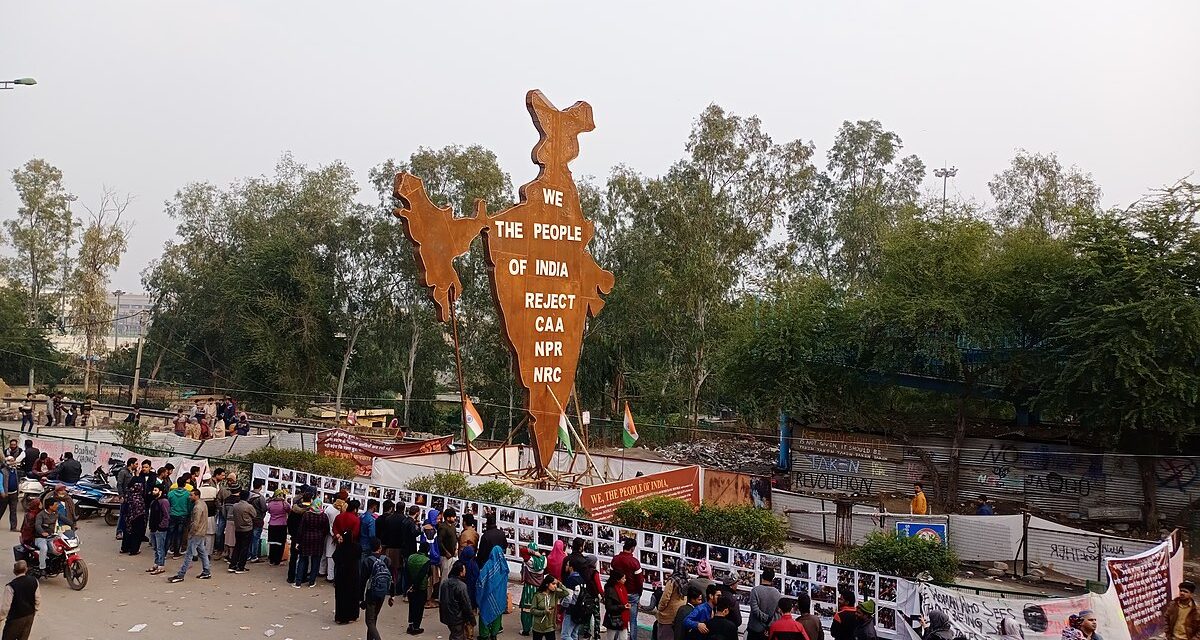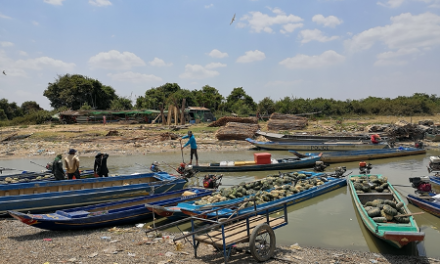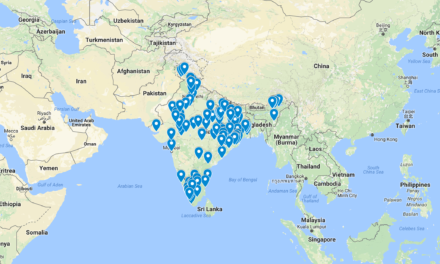Interview with Professor Manisha Sethi (NALSAR University of Law, Hyderabad, India)
by Mansi Sharma*
(With the adoption of the Citizenship Amendment Act (CAA) on 12 December, 2019, a faith based criteria for Indian citizenship was introduced for the first time in the history of the Indian republic. The legislation was opposed by many state governments who declared that they would stall the National Register of Citizens (NRC) and National Population Register (NPR) exercise; two processes that were linked to the CAA. In addition, the ruling regime was caught unawares by the mass civil disobedience that broke out across the country in response to the unjust and discriminatory law. Much of this was led by women and a spontaneous sit-in at Shaheen Bagh, a neighbourhood in South East Delhi, inspired dozens of such protests across the country. Despite police repression, curbing of the freedom of expression and imposing bans on public gatherings, these protests by common citizens were seen as one of the biggest mobilisations against the present government. The protests were abruptly stopped with the onset of the COVID-19 pandemic. In the meantime, authorities cynically used the crisis situation to arrest several anti-CAA activists and students under draconian anti-terror laws. We speak with Prof. Manisha Sethi on the validity of the CAA, the implications of the arrests and what next for the citizen’s movement. She is a legal expert and has been actively involved in the campaign for freeing activists and students who have been unjustly jailed with charges under anti-terror laws)
Question: On 20th June it is five months since the Citizenship Amendment Act (CAA) came into effect. There have been various petitions filed in the courts seeking for its stay and challenging its constitutional validity. Is this law constitutionally valid? What has been the Supreme Court’s response to the pleas to seek a stay on the implementation of the CAA?
MS: Constitutional experts, academics and legal scholars have decried the CAA as discriminatory, dangerous, arbitrary, and ultimately, unconstitutional. By introducing the criteria of religion, rendering some groups as favoured and entitled to fast track citizenship, while actively excluding other groups, namely Muslims, the new law departs from the foundational principles of our Republic. It mangles the vision of citizenship that inheres in the Citizenship Act 1955, i.e., legal belonging would not be determined by faith (jus sangunis) but by birth (jus solis). That such a path was chosen in the immediate aftermath of the Partition of the country is testament to the wisdom and sagacity of the Constituent Assembly, where the demand for religion-based citizenship was sidelined and prevailed upon.
It has been pointed out that while the Constitution allows for making classifications of groups and peoples (for example, identifying socially and educationally backward groups for the purpose of reservations or positive discrimination), the classifications that this law makes (favoured and disfavoured religious groups) fails the test of constitutionality. It fails to tell us why it includes Afghanistan with whom India does not share borders, but excludes Myanmar where religious persecution of Rohingyas is well documented. It fails to tell us why it would favour Hindus from Afghanistan but not from Sri Lanka, where Tamil Hindus could very well make a case for political asylum. In the end, it appears that the only grounds for the classifications that this law makes are political, and in line with the toxic majoritarianism that the present regime has been pursuing: non-Muslims from Muslim countries would be granted fast track citizenship. Being unreasonable and arbitrary, it stands in clear violation of Article 14 of the Constitution, which guarantees equality before law. In effect, the CAA goes against the basic structure of the Constitution, which is sacrosanct and cannot be tampered with, as laid down in the KesvanandBharaticase.
Moreover, the CAA can only be seen in conjunction with the exercise of the National Citizens’ Register(NRC) in Assam, which threatens to render hundreds of thousands of people stateless by declaring them foreigners, more precisely Bangladeshi. The CAA provides the government a legal mechanism to provide citizenship to non-Muslims declared foreigners, while continuing to exclude Muslims.
As expected, the CAA has been challenged in the Supreme Court by a clutch of petitions, but perhaps, also expectedly, the Supreme Court has been evasive and hesitant in hearing these. Indeed, it declared that it would not hear the petitions till the ‘violence’ ended. The violence it referred to was purportedly of the anti-CAA protest, even as it was a result of brutal police clampdown on the protestors. So far, the apex court has refused to grant a stay on the law, but has promised to hear the petitions. Two points may be noted here: first, the entire NRC exercise was driven by the Supreme Court; and secondly, we are currently living under the most “executive minded court”, where urgent questions of fundamental rights are being repeatedly pushed to the backburner.
Question: In the past few months a number of anti CAA students and activists have been arrested. How do you see this witch hunt of human rights defenders?
MS: Instead of engaging with the protestors, the state has chosen to unleash its naked power on them: detaining, and arresting them under harsh penal provisions. The charges under which a number of students and activists from Delhi were initially arrested were serious enough: 147 (rioting), 148 (rioting with deadly weapons), 149 (unlawful assembly), 124 A (sedition), 153 A (promoting enmity between different groups on grounds of religion, etc.) and 120 B (Criminal conspiracy), sections of the Arms Act, and even 302 (murder), 307 (attempt to murder). An omnibus conspiracy FIR has allowed the police to expand the circle of suspects, and the provisions of law. The Delhi Police invoked the draconian anti-terror law, Unlawful Activities Prevention Act (UAPA). This law has long been used to clamp down on dissent, and to render entire communities suspect.
The Delhi police has charged the activists with engaging in ‘unlawful activity, terrorist act, terrorist conspiracy, and raising funds for terror acts. They are now being held responsible for the violence that broke out in February in Northeast Delhi. This allows simultaneously the criminalization of the peaceful and democratic protests, while granting full immunity to the perpetrators of anti-minority violence.It blanks out even a whisper about the leaders of the rightwing party, who delivered hate speech, and who led angry mobs and gave ultimatums to the police to clear out protests.
Even at this moment, the dragnet continues to expand: Dr. Anwar, who treated patients who were attacked and injured (all Muslims) during the February violence has been mentioned in the chargesheet, besides being threated and intimidated by the police; a Sikh man who sold his flat to run a community kitchen for anti-CAA protestors has been named in the chargesheet of a police man’s killing during the violence.
In the state of Uttar Pradesh (UP) too, the wrath of the government has fallen on the protestors. It detained thousands of protestors, slapped egregious charges on them. Those arrested included alleged members of a Muslim organization, Popular Front of India, minors, and the elderly civil rights activist and retired police officer, S.R. Darapuri.
Dr. Kafeel Khan has been arrested under the draconian preventive detention law, National Security Act, which would allow the police to keep him in jail for up to a year without even having to file a chargesheet. In an act of unprecedented vindictiveness, the UP government published and publicly displayed names and photographs of protestors. The Allahabad High Court taking suo moto notice, termed it illegal and a wanton violation of privacy, and directed the state government to remove the hoardings.
The Supreme Court later referred the matter to a larger bench when the UP government appealed against the Allahabad HC order. The purpose of the arrests is clear: to back the break of the movement, to criminalize protestors, and to humiliate an entire community.
Question: Among the arrested activists is Safoora Zargar, a student who is pregnant and has been denied bail repeatedly. Do you think there is a valid ground before the Court to keep her under detention? What are the International law standards on pre-trial detentions?
MS: To our collective relief, Safoora has now secured bail, after three rejections. After having vigorously opposed her bail, the suddenly state ceded bail on “humanitarian grounds”, which it appears to have suddenly discovered. This could be partly owing to the intense international pressure against her continuing incarceration, and partly because the prosecution was trying to skirt a discussion on merits of the case. Knowing full well that there was not an iota of evidence against Safoora or others who have been arrested, the state would have wanted to avoid the grant of bail on merit. This would have paved the way for other accused to secure bail too.
India has one of the longest pre-trial detention periods in the world. Even under ordinary criminal law the prosecution can take up to 90 days to file the chargesheet, and this goes up to 180 days – a full six months – in the case of UAPA. The UAPA hollows out the constitutional guarantees of fair trial and right to life and liberty. Section 43D(5) of the UAPA, which deals with bail provisions, is in fact a replica of S. 49 (7) of the dreaded Prevention of Terrorism Act which was repealed in 2004. It makes it practically impossible for an accused to secure bail. Under this section, bail cannot be granted till the public prosecutor has been heard, and it can be declined if the magistrate concludes, upon reading the chargesheet, that the charges are true. So, in effect, an accused has to demonstrate her innocence, that too at the start of the trial, in order to be even granted bail. UAPA thus explicitly—and legally—denies the presumption of innocence.
But even so, the denial of bail to Safoora in the first instance was bad in law since the prosecution could not bring anything but hyperbole that would prima facie substantiate that she belonged to a terrorist organization or had committed any unlawful activity. In our experience, when it comes to terror charges, judges are usually squeamish about granting bail, preferring to defer to prosecutors and the narrative of national security.
Given the condition of prisons in India, how do you see the implications of incarceration of activists during Pandemic?
Indian prisons are over crowded – largely by under trials who languish in jails despite the dictum “bail, not jail” – and suffer from insanitary conditions, which makes them perfect incubators for a pandemic.Indeed, reports are suggesting that inmates are testing positive across the country.
In this background, the Delhi Police continued to make arrests, and interrogate students for long hours. In fact, the pace of arrests in Delhi picked up after express orders from the Home Minister. While the arrests are driven by the vindictive state policy, one fails to understand why the courts are denying bail in these times. Prisons need to be decongested for all prisoners – incarceration cannot be a death sentence, which it threatens to be.
Question:What is the future of the anti CAA movement? Which has been temporarily halted because of the COVID-19 Pandemic? What is your message to activists?
MS:It is abundantly clear that the government hopes to stamp out the faintest spark through its shock and awe of arrests and detentions. However, the anti-CAA protests were widespread – massive mobilisations and long drawn out sit-ins in dozens of cities, the likes of which we have not seen in a long time. These were led and steered by Muslim groups. Neither the traditional Muslim leadership, nor the typical civil society groups were at its helm. This period has seen the politicisation of young people and women, who have realised what the CAA represents: the legalisation of a second class citizenship. This may be a temporary set back but I doubt if it is the end of the movement. I would not be presumptuous to give any message to those who have led the movement. One can only hope, and learn from the movement.
The only message one can give is to the opposition parties, that they should support the movement beyond ritual platitudes, demand the release of the anti-CAA activists everywhere, and not shy away from standing with “Muslim causes”.
*Mansi Sharma is with Focus on the Global South and based in Delhi.










